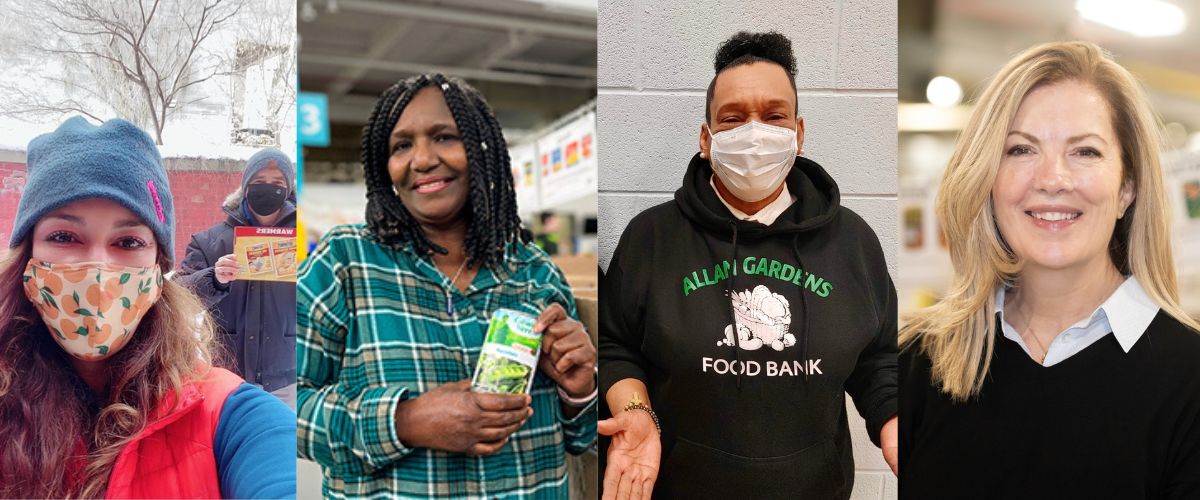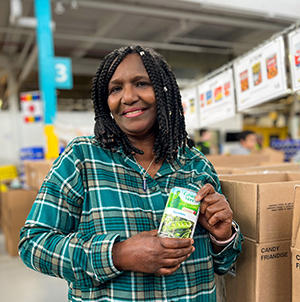
At Daily Bread Food Bank, we’re lucky to have no shortage of women leaders. Our founder was a woman, our board is chaired by a woman, and over half of our senior leadership team are women.
And that’s just the starting point. For Women’s History Month, we’re highlighting just a few of the remarkable women fighting to end hunger in our city.
When Shauna Harris sees a problem, she takes action to fix it. In March 2020 she founded a new program, Spadina-Fort York Community Care (SPAFYCC), as a direct response to the growing humanitarian crisis of homelessness in Toronto. She mobilized volunteers, appealed to donors and quickly started delivering thousands of food kits to encampments around the city.

As need grew, SPAFYCC grew with it. Shauna opened food banks in St. Lawrence Market and Alexander Park, with day shifts for the increasing number of retired seniors accessing food banks and evening hours for the growing ranks of working poor. She started a delivery service to get food to housebound seniors and those with disabilities. She began outreach to isolated Chinese seniors living with food insecurity with the help of Mandarin- and Cantonese-speaking volunteers. “We’re continuously trying to adapt and adjust and rise up to the growing needs in our community,” she said.
And she’ll continue to do so until government policy steps up to create the systemic changes needed to end poverty and hunger. “I can’t think of folks going hungry every night when there are ways we can help,” she said. “We cannot live in a society where our most vulnerable are left behind.”
Helen knows how to keep busy. She’s been in early childhood education for over three decades, volunteers with two environmental organizations and still manages to co-chair the Junction Residents Association (JRA), which has raised over 40,000 pounds of food for Daily Bread Food Bank under her leadership for the past two-plus years.
The group’s twice-yearly food drives, started by fellow JRA leader Stephanie Claydon, run like well-oiled machines. About 50 street captains cover nearly every street in the 3,200-household area, and their collective efforts earned the organization a Daily Bread Best in Class Award last year.

“When people are hungry … their quality of life is impacted substantially,” Helen said. “Their whole day, focusing on just feeding their children or feeding themselves — it’s devastating. The idea that someone would have to go hungry is just unthinkable for me.”
The food drive effort is a way for Helen and her neighbours to combat poverty while they wait for governments to legislate long-term solutions. “It brings us all together,” she said.
When need in one area of the city swells too high, Daily Bread turns to Ilham Saydna, our Community Program Development Coordinator. First, our team identifies zones where too many client visits and too few charity options are overwhelming local food banks. Then it’s Ilham’s role (among many) to find two things: a space suitable to open a new food bank and a group to run it.

It’s incredibly complicated work. Not every space will do: Does it have a freezer, a fridge, shelving? Is there room for clients to enter? Even more complex is that most appropriate venues lack community groups nearby to run a food bank, so Ilham calls, emails and knocks on doors to see if churches or local nonprofits can amass the volunteers needed to operate it. She’s constantly thinking about how to source needed equipment or other solutions for problems that arise before she can secure a new program. “I dream about this in my sleep,” she said.
With client visits skyrocketing, Ilham knows she has to do what it takes to open food banks now. Food is “the core,” she said. “The core of everything is giving people sustenance and making people feel like they can think right, that they can achieve and perform well in school, and that they can reach their potential.”
Gale Kelly lives near Moss Park and Regent Park, areas known for shelters and drop-ins amid a community with a fairly high average salary. “There’s this huge dichotomy between those that have and those that don’t, and I see it every day,” she said.

That’s part of the reason why she’s driven to give back. Gale serves on the boards of three nonprofits, including that of Daily Bread Food Bank, after volunteering for nearly a decade on a Habitat for Humanity committee. She became the Daily Bread board chair last year because she wanted to help fulfill the advocacy work she sees as crucial to ending hunger in Toronto, especially as food bank visits climb.
“We’re all humans. We need food as sustenance,” she said. “I just can’t understand how in a country as great as Canada, we’re not able to somehow manage that.”
The pandemic hit when sisters Justine and Bailee were just 14 and 12 years old. As the two saw restaurants shutter, schools close and fears rise, they thought to themselves: “How can we make people smile? What can we do to make people feel good about themselves and others?” That’s how they came up with I care about u, their company that creates and sells face masks (and now other merchandise) with that kindness-generating phrase emblazoned on the front.

The sisters donate 100% of their earnings to fighting food insecurity. $1,400 went to Daily Bread, along with a generous donation of face masks and sweatshirts for clients. Why did they choose to support the fight against hunger? They saw how food insecurity was becoming a growing concern, at the height of the pandemic and beyond. And food is “something essential to all humans,” they said.
When Meryl Wharton started at Allan Gardens Food Bank (AGFB) as a volunteer in 2012, the Downtown East agency saw about 150-200 clients every week. Now that figure has skyrocketed to about 1,000. In spite of the long days and growing numbers, Meryl, who became AGFB president in 2019, makes sure her food bank community feels like a family. The 40-some volunteers celebrate each other’s birthdays in the lunch room and those that leave for full-time jobs always come back to help out when they can. The six directors on the AGFB board work side by side the volunteers.

And that family feeling embraces AGFB’s clients as well. “It’s like I’m part of [the clients’] lives and they’re part of my life,” she said. “I could tell you who has diabetes, who has high blood pressure, who’s not supposed to have salt. I know them, in depth.”
She creates such strong bonds with clients that many of their children call her “auntie” out of affection. One client even made Meryl the godmother of her twin girls. Meryl leads out of love — that’s why she started volunteering in the first place. When she first saw the intense need at AGFB over a decade ago, she said that “everything just went right into my heart.”